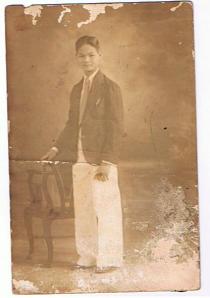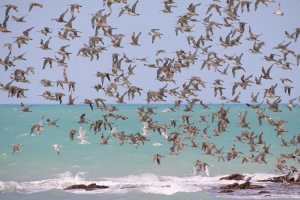Filed under: opinion | Tags: alegria imperial, business mirror, education, father, peregrine notes, Philets, Philippine Graphic, poetry, Poetry Reading, public relations, The Prince and the Pauper, travel page, University of Santo Tomas, writing
Often, intensely quiet in insulated spaces is how days unfold here, undistracted spaces that let roam vibrant memories like this week. As I write this piece midway through selecting my poems for a Poetry Reading event at the Chapters Bookstore downtown, my first ever, sponsored by Vancouver Haiku Group to which I belong, the late Serafin Albano, my father—a central figure in my writing life—looms largely.
If he did not impose his will on my choice of what I’d be, I could be languishing now in a dark even dank office somewhere in a turn-of-the century old building in Avenida where notaries get signed and sealed for a small fee if I didn’t get a teaching job, that is. He lugged me instead led by the youngest of my mother’s brothers, then in his junior year at UST’s Faculty of Philosophy and Letters, to the office of the dean. I had waffled but in a quick turn of mind, I plunged into a future of writing. But I ended up neither a journalist nor a poet not until decades after graduation and long after he had died. Instead, I sneaked into a writing career via public relations, ghost-writing for years.
From a back glance this morning in a continent way across the Pacific, I feel that I had glossed over how my father felt through those years I got stalled in what he couldn’t understand as tossing out words and images in anonymity. Picking through hints, I remember how he must have had great dreams of my name spangled on printed pages, as in his first wrapped gift on my eighth birthday, Mark Twain’s The Prince and the Pauper that he dedicated with a noble quote beyond a child’s grasp: “Education supplants intelligence but does not supply it.” Telling me a book was easier to find, he had hoped this gift would inspire me to write more—I had a year before then, sent him, where he lived and worked in Manila, a four-line poem scrawled on grade two paper, a ruse to ask for a doll.
Yes, I did write but not feeling particularly inspired only fed with words, perhaps, from books he and my mother piled on me. Early in college, I wrote a hilarious narrative on how giggly, overacting, mostly spoiled girls in a dormitory run by nuns from across UST, my first published article in Philippine Graphic magazine, in its ‘Student’s Page’ with my picture and a note on the author. It had so elated my father, he carried the issue opened on that page and showed it to everyone including waitresses. Some months later, I followed it up with an essay on fishes, which I used as a metaphor for the kinds of people we get to know in this “ocean of life”. I made him so happy he treated me out, and my friends at the dorm to dinner almost weekly. But none came long after that.
In a sudden spurt, probably stimulated by my travels in my job at the then National Media Production Center, I began weaving words into lyrical pieces for Dick Pascual’s travel page at the defunct Daily Express. My father brought each piece to Magallanes Drive, trudging his way through grime-textured air. Among the stash I dug out when clearing out stuff to immigrate to here, was a rough album he sewed on the side of those published pieces. And then again, I skidded into anonymity.
Still, we argued furiously about writing. Our last word-spars focused on my defunct Newsday lifestyle page, my first ever newspaper job. More critical and cutting than the late Teddy Berbano, then managing editor, my father devastated me by his correctness those evenings I dropped by to see him and my mother on my way to my own home—I had married by then. He had died by the time my page started shaping up and later when I wrote weekly full-page feature stories for Sunday lifestyle at Inquirer.
Once coming home from New York much later, I found the fiction writing paperback he kept sliding before me that I left unread, and cried and cried. The author, R. V. Cassill, also authored the Norton Anthology of Short Fiction from which my instructor in a writing course I took at NYU’s Continuing Education program selected our readings. Leafing through the pages he dog-eared and underlined, I had realized it’s exactly what I was learning. I’ve grappled with challenges he couldn’t have imagined like writing in NY alongside native speakers of English. But each step of the way, I would find his imprint.
Could a father shape a child’s destiny, carving a path like mine that I had long wavered to follow straight on? On the podium to read my published and award-winning poems here in Vancouver, a crowd their blond, blue, hazel, gray, maybe some black even green Irish eyes on me, I’m sure my father though invisible to all would be seated in the front row.
Published in Peregrine Notes by Alegria Imperial, Business Mirror, Manila, June 24, 2013
Filed under: essay, opinion, thoughts | Tags: alegria imperial, alien, ancestral lot, Baclaran, business mirror, Canada, Ceferino M. 'Nonoy' Acosta III, funeral, generations, home, homing birds, impermeable, invisible, Manila, Ninoy Aquino International Airport, Paz Memorial Homes, peregrine notes, refelction, relatives, Roxas Blvd., The Little Prince, tide surge, unchanged, United Airlines
The word makes me wonder if most of us, like me, were born to leave home and later pine to return. Are we somehow reflections of homing birds, like the swallows of Capistrano, or the terns and geese of North America? Or closer to what I know, do we return where we come from like the salmon of British Columbia that swims back when matured to the river where it was spawned?
But unlike birds and fishes, home, for me, is no longer a place. I suppose it has ceased being one as I changed from one whom I recall even as recently as a year ago. This sense of being alien, which in a way is a reality, could have started to deepen like a whorl in my heart since six years ago when I hurriedly unloaded six decades of my life to live in Canada. At first, I couldn’t imagine going back home.
Where is home? Not that last apartment I emptied not only of accumulated debris but also of mementos and tags of moments lived, which my mother moved from house to house. Or an architect’s house that stood in an ancestral lot owned by five generations I was married into, which I had to sell. Where my sister and I lived with our parents for twenty years close to her high school is now a meaningless shell along smoggy Ramon Magsaysay Boulevard.
Not even where I was born already a vacant space shaded by an ageing pomelo by the time I learned how to read, the borrowed hut lent by an uncle of my father for my mother’s family driven into homelessness by WWII. Or where I grew up with my father’s mother said to be another temporary home built after their stone house from across was burnt. When my mother had to move back to her mother’s for care on the birth of my sister and my other grandmother debilitated with arthritis had to be hauled to a daughter in Manila, I watched it painfully torn down piece by piece and hoisted on to a carabao cart, with my childhood in it.
Massive convent walls where I was sent after high school and the dormitory run by nuns from across UST where I lived for six years sort of healed the gnawing loss I nursed from seeing those fragile walls just gone but I couldn’t call them home. Where then lies home? In my recent homecoming to Manila, I realized that home is both not a place and a structure but something “visible only to the heart” as The Little Prince of Antoine de Saint Exupery told the fox.
My homecoming last month was both ideal and deeply sad. Like a tide surge, my cousin’s death, Ceferino ‘Nonoy’ M. Acosta III, left no space for me to waver about a flight and waffle about gifts to bring. I was so wrapped up in my emotions that the smog, which swarmed the path of United Airlines on its descent to NAIA, failed to daunt me. Nor did the snarl in Baclaran, being a Wednesday, through Roxas Blvd. unnerve me. The landscape though felt shrunken and tighter with buildings now unfamiliar to me, and a crowd thrice multiplied; yet as the SUV that fetched me coughed through clogged streets, it had seemed normal.
I couldn’t guess how I would feel arriving at Paz Memorial Homes; it would be my first as a balikbayan. But with my first step into the chapel where Nonoy lay in state, I felt like I’ve been in it the day before—how many times have I bristled in the arctic air conditioning during a wake of relatives and friends? My uncle and aunt soon swept me in their grieving arms and we wept, sobbing words for the smiling Nonoy, a scene I have watched with other relatives countless of times.
When I turned to the faces riveted on us, there were my other uncles, aunts, cousins, nieces, nephews, relatives, and former neighbors sniveling with us. While most like me bore marks of time’s subtle scratches, each was whom I knew through the eyes—that invisible space impermeable to time, where I met theirs and my unchanged self.
We laughed, relishing not what was said but simply from the thrill of retrieving lost moments of being together. In the few days that followed, as we exchanged more of such moments–some with Nonoy in our midst–we kept flinging open the closed doors that had been shut by years. And as the burial crowd thinned out, when our clan gathered for what for me was yet another last time together, I had ceased to wonder if I have a home to go back to.
So like a homing bird and the salmon I had managed, indeed, with a tracker so precise scientists remain baffled, to land in or swim back to the same exact spot called, home. Yet unlike them, it’s not a spot I arrived at but a roof with walls I carry around unseen.
Published on January 6, 2013 Peregrine Notes, Opinion Page, Business Mirror Philippines
Photo: waders roosting at high tide in Roebuck Bay, Australia courtesy of wikipedia

